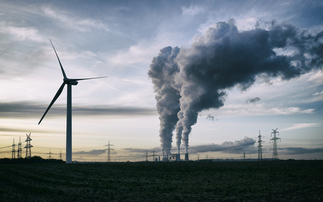Keir Starmer arrives at the Labour Party Conference in Brighton last year | Credit: Keir Starmer's Twitter
Policy set to be formally unveiled as part of string of energy announcements next month, according to reports
Labour is expected to promise that it will block any new oil and gas fields from being developed in the North Sea if it wins the next General Election, according to widespread media reports over the weekend.
The Party's leader Sir Keir Starmer is reportedly poised to announce the pledge as part of a wider energy policy package during a trip to Scotland next week, according to the Sunday Times.
It comes six months after Starmer first suggested the Labour manifesto would include a pledge to issue no new North Sea fossil fuel licences, leaving companies only able to drill sites which already have existing permission from the authorities.
Oil and gas projects that have already been approved by the government would therefore reportedly be unaffected by the policy, with the exception of the controversial Cambo and Rosebank schemes, which Labour has already said it would block.
Sources also told the Guardian Labour's upcoming energy policy package would not just include a ban on new North Sea oil and gas licences, but a pledge that a Labour government would only borrow to invest in green projects.
The Party is expected to claim its energy policy package will create up to half a million jobs in renewable energy in the UK, including 50,000 in Scotland, according to the newspaper.
In the midst of an energy crisis, and with Labour continuing to command strong polling leads over the Conservatives, the opposition Party's energy policies are therefore currently awaited with baited breath in the North Sea oil and gas sector. Any such ban on new oil and gas fields is sure to prove controversial within the sector, although is likely to be widely welcomed by climate campaigners.
The Labour Party had not responded to BusinessGreen's request for comment at the time of going to press.
But speaking to Sky News on Sunday, shadow work and pensions secretary Jonathan Ashworth said more details on the party's energy policy would be announced soon.
"We know we've got to move to more renewable sources of energy," he said. "It's important for our climate change commitments, but it's also the way in which we can bring energy bills down for consumers. This isn't about shutting down what's going on now. We will manage those sustainably."
The mooted pledge would stand in stark contrast to the government's approach, which has seen it hand out new licences for domestic oil and gas projects in the North Sea, while insisting that projects will only go ahead if they and prove they pass its controversial 'climate compatibility test'. The Conservative government argues exploiting new oil and gas fields can help bolster Britain's energy security, and that domestic production produces fewer greenhouse gas emissions than that imported from elsewhere.
However, a report by the International Energy Agency (IEA) in 2021 - which was commissioned by the UK government ahead of COP26 - warned that no new oil and gas fields could be developed if the world is to cap global temperature rise at 1.5C, a finding that has been corroborated by numerous other high-profile studies.
Campaigners and energy experts have also warned that - unlike increasing renewables capacity that can reduce citizens' and businesses' dependence on expensive and polluting fossil fuels - ramping up oil and gas production does little to deliver energy security or bring down energy bills, as gas prices are set by the international market, and the majority of gas produced in the UK is exported.
Tessa Khan, executive director and founder of campaign group Uplift, said the news that Labour is poised to commit to halting further new oil and gas development in the North Sea was "absolutely the right decision".
"It's clearly what's required to preserve a safe and liveable climate," she told BBC Scotland this morning, adding that the UK's energy crisis is driven by dependency on fossil gas. "The only way we can get ourselves out of that situation is to scale up clean, local renewable energy which we know is much cheaper than gas as a source of electricity."
Last week the Climate Change Committee said the net zero transition could unlock a net increase in jobs across the UK of 725,000, but that some jobs in carbon intensive industries such as North Sea oil and gas would inevitably be impacted and would therefore require careful planning to ensure a just transition.
But some trade unions - including one of Labour's biggest donors, GMB - have voiced concerns about the potential impact the policy could have on jobs on the North Sea region.
Offshore Energies UK (OEUK) - the trade association for the North Sea oil and gas sector - also argued a ban on further fossil fuel development in the region would undermine UK energy security, threaten jobs and lead to higher energy bills.
"Everyone is clear that the energy system must change but business and government must do this in partnership," said David Whitehouse, OEUK's chief executive. "Labour's approach risks sending the wrong signals."
Want to understand what is going on at the cutting edge of sustainability? Check out BusinessGreen Intelligence - the premier information for professionals focused on the UK's green economy.











